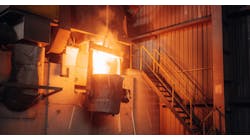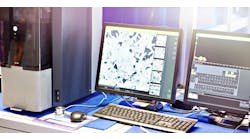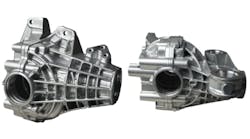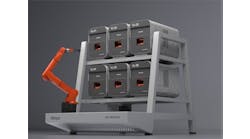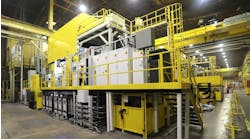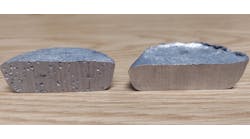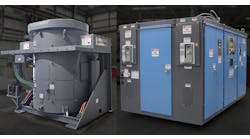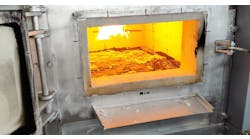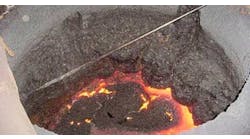In metalcasting our focus is typically on large-scale problems, as they often have the greatest impact on our business results. In the business of producing secondary aluminum or aluminum castings there is no question that often it is a game of scale and efficiencies applied to large amounts of metal, liquid or solid. However, there are times when there is a need to focus on smaller amounts of metal, and how to transfer it both safely and efficiently. For example: when liquid metal must be transferred out of a casting machine after a run, or when there is an alloy change. Another example is delivering small, accurate doses directly to a mold to make a single casting. Let’s look at some ways to use niche product technologies to facilitate the safe and efficient transfer of small amounts of liquid metal.
No substitute for safety — Small amounts of molten aluminum can be transferred in a variety of ways, including by hand. While this may be necessary in certain situations, it represents a host of concerns related to safety and well-being for employees. Even with all the appropriate PPE, the risk of accident and bodily harm increases substantially when we deploy manual processes in foundries and cast houses. For smaller and medium sized companies the cost of these types of accidents can be enough to endanger the future of the enterprise. This when coupled with all the other impacts that accompany these very unfortunate situations make it clear they are best avoided. Fortunately, there are niche technologies that have focused on these types of applications and can be deployed to make small transfers of molten aluminum much safer and much more cost effective.
Mechanical pumps — Manual transfer processes are associated with smaller operations or those operations that need to transfer small amounts of metal, either frequently (filling a mold) or infrequently (emptying a furnace.) In all these cases there are effective mechanical methods that can eliminate the need for people to handle the metal directly.
For several years Molten Metal Equipment Innovations (MMEI) has been working to improve the effectiveness of smaller mechanical pumps capable of handling the metal transfer both safely and reliably. In many of these types of applications the critical factors are portability and flexibility, as the transfer need is either infrequent or needed in different locations.
The Speed Demon pump series provides a solution that can be powered by air or (preferably) electricity and moved to the spot where the transfer is needed. Pumps can be sized and configured to the size of the application, and the design allows it to be used without all the more normal infrastructure associated with transferring larger amounts of molten metal.
In all cases the pump can be operated safely from a remote location, keeping the operator out of direct contact with the metal and thus significantly reducing the likelihood of accidents. The smaller pumps also can facilitate emptying furnaces and crucibles of the remaining molten metal, avoiding the need for hand ladling. The safety considerations coupled with the efficiency make this a very attractive alternative.
Dosing pumps— Another example of the challenge of transferring smaller amounts of aluminum occurs when there is a need to deliver a specific amount to a mold or a shot. Often, in these cases, a high degree of accuracy will be necessary regarding the amount to be transferred and the need for a smaller amount (a single casting.)
For this there is another niche technology that can be deployed. In these situations, we are likely to incorporate a pump into the metal delivery system so that the emphasis is on accuracy and repeatability. Using metal level sensing lasers, and our latest Smart technology allows us to provide a reliable, accurate transfer each time. Again, this will replace the need to deliver metal manually.
The foundry industry has made strides in safety and efficiency, and it is certain that continued innovation will lead to even greater progress. As the requirements of the industry become more demanding, new niche technologies will be developed, to take these gains to even greater levels. Technologies that make the working environment safer and also improve the efficiency of an operation are truly "win-win" opportunties.
Jeff Keller is chairman and CEO of Molten Metal Equipment Innovations. Contact him at LinkedIn, or visit www.mmei-inc.com
